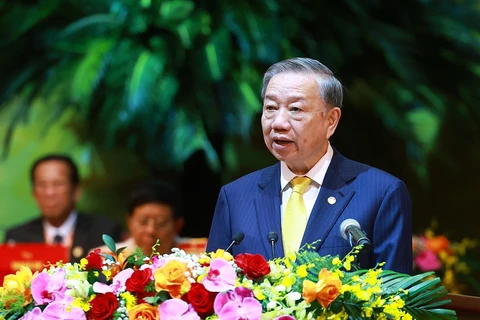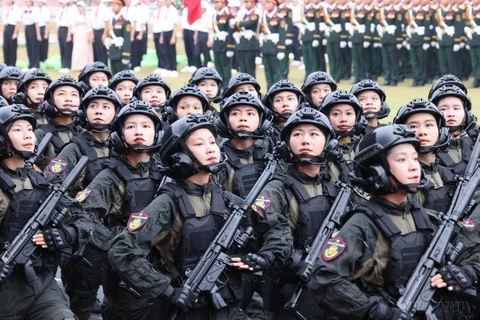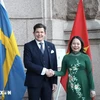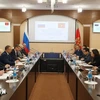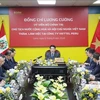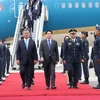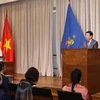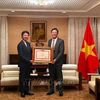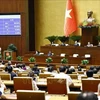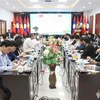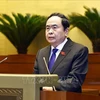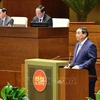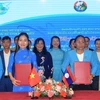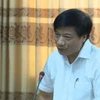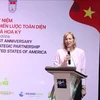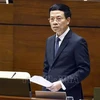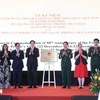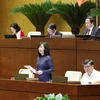
Vietnam's new era: Development vision and global standing
On September 2, 1945, at the historic Ba Dinh Square, President Ho Chi Minh read the Declaration of Independence, solemnly announcing the birth of the Democratic Republic of Vietnam, now the Socialist Republic of Vietnam.
For the past 79 years, under the leadership of the Communist Party and guided by the immortal principle “Nothing is more precious than independence and freedom,” the Vietnamese people have united in solidarity, supported by international cooperation, to achieve successive victories in the nation’s revolution, liberate and unify the country, successfully implement renewal policies, and confidently advance toward socialism.
In his speech celebrating the 79th anniversary of the National Day of the Socialist Republic of Vietnam (September 2, 1945 - September 2, 2024), General Secretary and State President To Lam emphasised that, under the Communist Party's leadership and in the spirit of “self-reliance, self-confidence, self-strength, resilience, and national pride,” bolstered by national and international solidarity, the Party would unite with the people to lead Vietnam into a new era - a time of national growth and an active contribution to peace, stability, and development both in the region and around the world.
Vietnam’s new era - A vision for national development
In recent addresses, General Secretary To Lam has often referenced the "new era" and "era of national rise." This "new era" signifies a historical phase marked by significant achievements in social, cultural, political, and natural advancements over the decades. It’s a period driven by strong determination and self-confidence to overcome challenges and pursue aspirations for greatness.
"The great achievements attained over 79 years since the founding of our nation are due to the patriotism, unity, self-reliance, resilience, and the strong aspirations for independence, freedom, and happiness of the Party, the State, and the Vietnamese people. At the same time, under the wise and skillful leadership of the Communist Party of Vietnam—a Party that has dedicated itself to serving the people as its purpose and reason for existence, absolutely loyal to the interests of the nation and the people, as President Ho Chi Minh once said, ‘Apart from the interests of the Fatherland and the People, our Party has no other interest’—we have navigated the revolutionary path, guiding Vietnam to overcome every challenge and achieve many remarkable feats."
Evaluating Vietnam’s opportunities, strengths, and challenges at home and abroad, the Party, under the General Secretary's leadership, declared, “Our nation stands at a historic juncture, a new era requiring fundamental innovations in leadership to guide the country forward.” He highlighted that the accomplishments of the past 79 years stem from the Party’s unwavering dedication to the people's welfare and loyalty to the nation’s interests, as Ho Chi Minh once said, “Outside of the interests of the people and the country, the Party has no other aim.”

The Party, the State, and the Vietnamese people are now striving for accelerated achievements as outlined in the Resolution of the 13th National Congress of the Communist Party, targeting milestones like the 80th anniversary of independence and the 50th anniversary of reunification. These celebrations align with goals for 2030 - marking 100 years under Party leadership - and 2045, when Vietnam aims to become a high-income developed nation, fulfilling the vision in Ho Chi Minh's will to build a "peaceful, unified, independent, democratic, and strong Vietnam."
Dr. Nguyen Van Dang from the Ho Chi Minh National Academy of Politics noted that nearly 40 years of economic reform have propelled Vietnam to a new standing internationally. In 2021, the 13th Congress set strategic goals for Vietnam to achieve upper-middle-income status by 2030 and to become a developed nation by 2045. This period from 2021 to 2045 signifies a transformative era for the nation, building on a century of revolutionary struggle and national development since 1975.
Guided by the core values of “prosperity, strength, democracy, equality, and culture,” the Party has identified three strategic priorities since the 11th Congress: institutions, human resources, and infrastructure. These three are material pillars for national development, representing tangible assets, which must be bolstered by spiritual cohesion and inner motivation to achieve long-term national objectives.
National spirit as a driving force
Vietnam’s history of founding and defending the nation has forged a unique national spirit of patriotism, pride, and courage for independence. This resilient spirit, personified by historical figures like the Trung Sisters, Ngo Quyen, Tran Hung Dao, Le Loi, and Quang Trung, is integral to the country’s identity.
During the 20th century, revolutionary leaders further strengthened this spirit through their sacrifices for independence, encapsulated in Ho Chi Minh’s enduring phrase, “Nothing is more precious than independence and freedom.”
Recently, former General Secretary Nguyen Phu Trong’s statement, “Honor is the most sacred thing,” further underscored the strength of this spirit.
History shows that a strong national spirit unites individuals with diverse interests toward the nation’s greater good. Vietnam's rise in this new era depends on awakening and harnessing this collective spirit to achieve the 2045 development goals.
Recognising the power of the national spirit, recent Party Congresses have consistently highlighted the importance of inspiring patriotism, national pride, unity, and a shared vision of prosperity and happiness.
International perspectives on Vietnam’s new era
Amiad Horowitz, a journalist at People’s World and member of the Communist Party USA, sees Vietnam’s new era as a landmark in the nation’s integration with global trends while upholding principles of independence and self-reliance. He asserts that Vietnam’s goal of achieving high-income status by 2045 demonstrates the country’s adaptability in a changing world and its commitment to fulfilling its development goals.
"Every country has its own culture, history and “national spirit”, and this is unique to each and every country. For Vietnam, the national spirit was built through a history of overcoming all challenges, from the defeat of colonialism and imperialism, through the success of Doi Moi, to the success of Vietnam’s battle to defeat the COVID pandemic.
Given this history, we can see how Vietnam’s national spirit will help fuel the country on its path in this new era and help the country overcome any difficulties that it might meet while through this new era."
Horowitz highlighted the vital role of Vietnam’s national spirit, deeply embedded in its people and cultivated through struggles against colonialism and imperialism, as well as the successes of the Doi Moi and resilience during the COVID-19 pandemic. These factors will play a crucial role in driving Vietnam’s progress in the new era.

The American journalist also praised Vietnam’s unique “bamboo diplomacy,” which enables the country to maintain good relations with other nations and navigate geopolitical challenges while protecting its core interests.
He noted that Vietnam’s self-reliance in technology, especially in semiconductor development, will be a critical driver. “Vietnam doesn’t depend on others but leverages strong relationships to pursue an independent development path,” Horowitz affirmed.
"Vietnam’s approach to foreign policy has allowed it to develop friendships with almost every country and use those friendships to help Vietnam and the Vietnamese people progress on the road of modernization and the building of socialism."
Vietnam’s bamboo diplomacy has also attracted attention from international scholars. Uch Leang of Cambodia’s Royal Academy describes it as a diplomatic approach that maintains harmonious relationships with both major and smaller nations. Professor Yoichiro Sato of Ritsumeikan University, Japan, adds that Vietnam’s consistent policy of independence coupled with flexibility has solidified its identity as a country that maintains autonomy through historical challenges. This enduring spirit allows Vietnam to pursue a unique development path focused on peace and stability.
Amid complex international relations, Vietnam remains steadfast in its socialist path, creatively applying Marxism-Leninism and Ho Chi Minh’s thought while harmonising national traditions with global culture. This peace-oriented diplomacy has garnered admiration from leaders and scholars worldwide.
Professor Carl Thayer of the University of New South Wales, Canberra, Australia, highlights Vietnam’s establishment of a broad political and diplomatic network with major powers and leading multilateral organisations globally. “This has enhanced Vietnam’s international reputation and status while contributing to its economic growth,” he said, noting the unique appeal of Vietnamese culture in facilitating positive relationships.
“Vietnam’s soft approach has enabled the country to build and maintain strong international relations based on mutual respect and understanding.”
“Vietnam’s soft approach has enabled the country to build and maintain strong international relations based on mutual respect and understanding,”

“Vietnam’s soft approach has enabled the country to build and maintain strong international relations based on mutual respect and understanding,” he added.
New era - A global position for sustainable development goals
General Secretary To Lam emphasised that Vietnam has emerged as a symbol of peace, stability, and hospitality, a destination for investors and tourists, and ranks among the world’s top 40 economies and the top 20 in trade. From a formerly isolated nation, Vietnam now maintains diplomatic relations with 193 countries, including strategic partnerships with 32 countries and active participation in over 70 regional and international organizations.
With the welfare of its people at the forefront, Vietnam is regarded by the United Nations and the international community as a success story in poverty reduction, continuously improving the living standards of its people. As Vietnam enters this "era of national rise," the Party’s commitment to development goals reflects the strength of the national spirit. Anchored in strategic vision and sustainable values, Vietnam is well-prepared to tackle challenges and seize opportunities in the coming decades.
Recent Party Congresses have underscored patriotism and national unity as essential drivers for a thriving Vietnam. Vietnam aims not only for prosperity but also to contribute to global peace and stability. General Secretary To Lam expressed confidence in Vietnam’s ability to collaborate with the international community to build a peaceful, sustainable, and just world, upholding the spirit of the United Nations Charter and international law.
With a steadfast commitment to addressing international issues based on principles of legality, humanity, equality, and mutual respect, Vietnam has strengthened its voice on regional and global stages. This growing influence is the result of Vietnam’s wise policies and visionary leadership, reflecting the nation’s intellect, resilience, cultural heritage, and enduring tradition of peace.

Vietnam’s consistent approach to international issues has gained global recognition. Palestinian Ambassador to Vietnam Saadi Salama affirmed that Vietnam’s commitment to legality, humanity, equality, and mutual respect has strengthened its voice on regional and global platforms.
"This outcome is the result of Vietnam’s correct path and wise leadership - a testament to the nation's intellect, resolve, culture, and peace-loving tradition," Ambassador Salama stated./.
